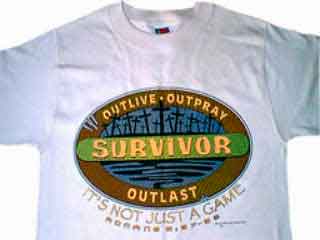 This
t-shirt capitalizes on the fame of the network reality-game show "Survivor,"
here transforming the literal "survival" into a spiritual survival, evoking
notions of afterlife, heaven, hell, and salvation.
This
t-shirt capitalizes on the fame of the network reality-game show "Survivor,"
here transforming the literal "survival" into a spiritual survival, evoking
notions of afterlife, heaven, hell, and salvation.CHRISTIAN POPULAR CULTURE
In the twenty-first century, particularly in the United States, the particularities of Christian material culture have begun to extend (almost aggressively) beyond the bounds of sacred and devotional space and art. In some ways, this explosion of Christian popular culture is similar to the explosion of massive and lavishly decorated basilicas following the legalization of Christianity in the fourth century: this is the putting forward of a public Christian "face," often employing the idioms of everyday cultural expression.
Some Christian popular culture is simple yet pervasive, such as the bumper sticker or t-shirt:
 This
t-shirt capitalizes on the fame of the network reality-game show "Survivor,"
here transforming the literal "survival" into a spiritual survival, evoking
notions of afterlife, heaven, hell, and salvation.
This
t-shirt capitalizes on the fame of the network reality-game show "Survivor,"
here transforming the literal "survival" into a spiritual survival, evoking
notions of afterlife, heaven, hell, and salvation.
This bumper stickers likewise adapt popular culture forms (in ways that, one would think, skirt dangerously close to patent infringement) in order both to catch the viewer's eye, regularize and normalize the Christian message, but also subtly appropriate and even critique the relative "emptiness" of popular culture (i.e., the smart chihuahua will not waste his/her time with burritos, but will focus on salvation).

Other Christian popular culture is more ambitious: TV shows, full-length feature films, mainstream pop music groups.
In the 1970s, prominent evangelical preachers (such as Pat Robertson and Jerry Falwell) actually founded entire networks (operating mainly as cable stations, although occasionally purchasing local TV affiliates) to spread their Christian message. They did not just show typical "Christian" fare (sermons, prayer services, devotional material) but attempted to craft a full-service "Christian culture": talk shows, exercise programs, cooking shows, even fictional entertainment.
In recent years, these U.S. operations have expanded outward dramatically:
 This
is the Romanian correspondent for CBN ("Christian Broadcasting Network"), on a
glossy soundstage that invokes other "cable news" channels such as CNN and
MSNBC. The suggestion is that there can (and, according to these
particular broadcasters, should) be a complete and total overlap between
"culture" in all of its forms, and Christian identity.
This
is the Romanian correspondent for CBN ("Christian Broadcasting Network"), on a
glossy soundstage that invokes other "cable news" channels such as CNN and
MSNBC. The suggestion is that there can (and, according to these
particular broadcasters, should) be a complete and total overlap between
"culture" in all of its forms, and Christian identity.
end of slideshow